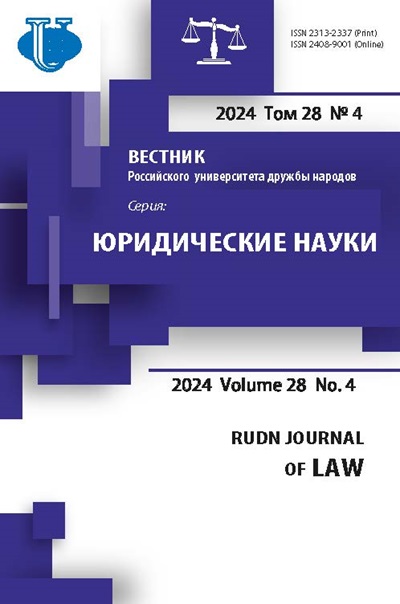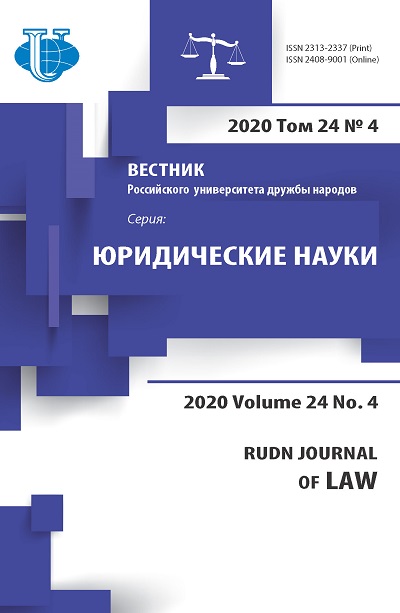ОТВЕТСТВЕННОСТЬ ЗА ТОРГОВЛЮ ЛЮДЬМИ ПО РОССИЙСКОМУ УГОЛОВНОМУ ПРАВУ: ВОПРОСЫ ЗАКОНОДАТЕЛЬНОЙ ТЕХНИКИ И ПРАВОПРИМЕНЕНИЯ
- Авторы: Скрипченко Н.Ю.1
-
Учреждения:
- Северный (Арктический) федеральный университет им. М.В. Ломоносова
- Выпуск: Том 24, № 4 (2020)
- Страницы: 1078-1099
- Раздел: УГОЛОВНОЕ ПРАВО
- URL: https://journals.rudn.ru/law/article/view/25254
- DOI: https://doi.org/10.22363/2313-2337-2020-24-4-1078-1099
Цитировать
Полный текст
Аннотация
Сегодня ни одно государство в мире не может с уверенностью сказать, что не сталкивается с проблемой торговлей людьми, которая не зависит ни от геополитического положения страны, ни от социально-экономической ситуации. Негативные социальные последствия преобразований в России конца прошлого века определили не только ее транзитное назначение при незаконной миграции рабочей силы, но и роль «отправителя» и «получателя» «живого товара» (преимущественно женщин и детей), предназначенного для эксплуатации (в т.ч. сексуальной), суррогатного материнства, изъятия органов и тканей. Стремясь максимально придерживаться международных дефиниций и опираясь на имеющейся опыт правового регулирования, российский законодатель закрепил в УК норму (ст. 1271), содержащую редакционные изъяны, затрудняющие ее реализацию. Цель исследования - сформулировать предложения по устранению выявленных в ходе исследования недостатков законодательного определения торговли людьми, порождающих трудности правоприменения. Методологическую основу составляют общенаучные (анализ и синтез, диалектика) и частнонаучные методы исследования (системноструктурный, формально-юридический, логический, лингвистический). В работе выявляются терминологические сложности, связанные с включением конвенционных норм в уголовное законодательство; отмечая необходимость установления повышенных гарантий безопасности детства, автор не усматривает необходимости самостоятельной криминализации торговли несовершеннолетними. Определяя технико-юридические недостатки в определении «торговля людьми» и «эксплуатация человека», автор предлагает пути их решения посредством реформирования уголовного законодательства и судебного толкования на уровне Пленума Верховного Суда РФ.
Об авторах
Нина Юрьевна Скрипченко
Северный (Арктический) федеральный университет им. М.В. Ломоносова
Автор, ответственный за переписку.
Email: n.skripchenko@narfu.ru
доктор юридических наук, профессор кафедры уголовного права и уголовного процесса
163002, Российская Федерация, г. Архангельск, набережная Северной Двины, д. 17Список литературы
- Albertin, C. (2019) Preventing Human Trafficking and Smuggling of Migrants, Prosecuting Perpetrators, and Protecting Victims: With a Special Focus on the Work of the United Nations Office on Drugs and Crime. Migration and Refugees: Global Patterns and Local Contexts. Nova Science Publ., pp. 13-32
- Алихаджиева И. Недостатки законодательной регламентации уголовно-правовой борьбы с торговлей людьми // Уголовное право. 2006. № 5. С. 31-35
- Alvari, H., Shakarian, P., Snyder, J.E.K. (2016) A non-parametric learning approach to identify online human trafficking. In: Mao W., Wang G.A., Zhou L., Kaati L. (ed.) IEEE International Conference on Intelligence and Security Informatics: Cybersecurity and Big Data, ISI, 15 November 2016, Tucson, United States. Article number 7745456., pp. 133-138, doi: 10.1109/ISI.2016.7745456
- Andrews, S., Brewster, B., Day, T. (2016) Organised crime and social media: Detecting and corroborating weak signals of human trafficking online. In: Haemmerle O., Stapleton G., Zucker C.F. (ed) Lecture Notes in Computer Science (including subseries Lecture Notes in Artificial Intelligence and Lecture Notes in Bioinformatics). 5-7 July 2016, Annecy, France., pp. 137-150, doi: 10.1007/978-3-319-40985-6_11
- Букалерова Л.А., Атабекова А.А., Симонова М.А. К вопросу об имплементации положений Конвенции Совета Европы о защите детей от сексуальной эксплуатации и сексуальных злоупотреблений в российское законодательство // Международное публичное и частное право. 2015. № 6. С. 25-29
- Cockbain, E., Bowers, K. (2019) Human trafficking for sex, labour and domestic servitude: how do key trafficking types compare and what are their predictors? Crime, Law and Social Change. 71 (1), 9-34, doi: 10.1007/s10611-019-09836-7
- Ерохина Е. Торговля женщинами: феномен реальный или надуманный? // Торговля людьми: социокриминологический анализ / Центр по изучению транснациональной преступности и коррупции; Под ред. Е. В. Тюрюкановой. М.: Academia, 2002. С. 41-43
- Gallagher, A.T. (2009) Human Rights and Human Trafficking: Quagmire or Firm Ground? A Response to James Hathaway. Virginia Journal of International. 50 (1), 789-848
- Gallagher, A.T. (2010) The International Law of Human Trafficking. Cambridge University Press
- Гаммаев В.М. Особенности признаков субъективной стороны торговли людьми // Современное право. 2011. № 7. С. 132-135
- Hathaway, J.C. (2008) The Human Rights Quagmire of "Human Trafficking". Virginia Journal of International Law. 49 (1), 1-59
- Иногамова-Хегай Л.В. Торговля людьми в российском и международном праве // Уголовно-правовые, пенитенциарные принципы и их реализация: правотворческий, правоприменительный уровни: материалы Всероссийской научно-практической конференции. Саратов, 28-29 марта 2005 г., в 2 т. / Под ред. Б.Т. Разгильдиева, Саратов, 2005. С. 44-46
- Костенко Н.И. Роль мирового сообщества и России в противодействии торговле людьми // Международное право и международные организации. 2016. № 1. С. 28-40
- Кузнецова Н.Ф. Проблемы квалификации преступлений. М.: Городец, 2007. 336 с
- Доклад «О состоянии борьбы с торговлей людьми в Российской Федерации» / под ред. Е.Б. Мизулиной. М., 2006. 160 с., available at: http://www.spbredcross.org/images/ docs/Human-trafficking-in-the-Russian-Federation.pdf. (Accessed 02 March 2020)
- Мизулина Е.Б. Торговля людьми и рабство в России: международно-правовой аспект. М.: Юристъ, 2006
- Наумов А.В. Разграничение преступлений, предусмотренных ст. ст. 127.1 и 240 УК // Законность. 2007. № 6. С. 10-15
- Нигматуллин Р.В. Организация Объединенных Наций как координатор усилий мирового сообщества в борьбе с торговлей людьми // Перспективные разработки науки и техники: материалы VII Международной научно-практической конференции / под ред. С. Горняка, 2011. С. 69-75
- Пудовочкин Ю.Е. Ответственность за торговлю людьми по российскому уголовному праву // Сравнительное конституционное обозрение. 2007. № 3. С. 103-108
- Рарог А.И. Настольная книга судьи по квалификации преступлений. М.: Проспект, 2011. 480 с
- Рарог А.И., Хелльманн У., Головненков П. Торговля людьми в российском и немецком уголовном праве. Lex Russica. 2008. № 5. С. 78-83
- Сакаева О.И. Реализация международно-правовых норм в сфере противодействия торговле людьми в Российской Федерации // Журнал российского права. 2014. № 2. С. 110-118
- Сердюкова Е.В. Основания освобождения от уголовной ответственности за торговлю людьми // Законность. 2013. № 2. С. 54-57
- Устинова, Т.Д., Измайлова И.Д. Статья 127.1 УК РФ: проблемы применения и законотворчества // Современное право. 2005. № 10. С. 17-21
- Vanyoro, K.P. (2019) ‘Skeptics’ and ‘believers’: anti-trafficking, sex work, and migrant rights activism in South Africa. Gender and Development. 27 (1), 123-137, doi: 10.1080/13552074.2019.1570731
















